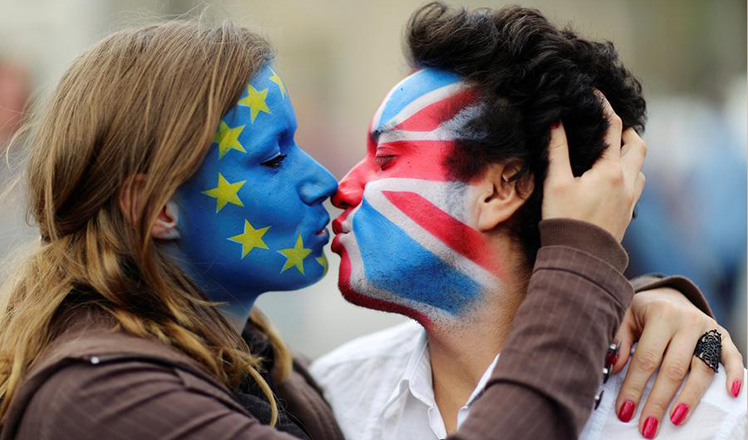Brexit reminds EU to heed the voice of people
Updated: 2016-06-25 09:39
(China Daily)
|
||||||||
 |
|
Supporters of the Stronger In Campaign react as results of the EU referendum are announced at the Royal Festival Hall, in London, Britain June 24, 2016. [Photo/Agencies] |
To be, or not to be a European Union member: that was the question. The answer split Great Britain and shocked the rest of the world on Friday.
In spite of earnest pleas for the United Kingdom to remain, and warnings of dire economic, political consequences of Brexit (or Britain's exit from the EU), the referendum was a matter of popular choice, not a process dictated by reason and cool-headed analysis.
British Prime Minister David Cameron, who has announced his resignation, may not formally notify the EU meeting on June 28-29 about his country's decision to part ways with the other 27 members of the bloc. But it will only be a matter of formality to declare the 43-year marriage dissolved.
It is a very bad day for the EU-the process of European integration has suffered an unprecedented, potentially fatal blow. It is not necessarily a good one for the UK either, as the country has just embarked on a path of uncertainty and instability.
For the moment, global attention has by and large focused on the immediate financial and economic fallout. As the International Monetary Fund, US Federal Reserve and Bank of England warned earlier, the referendum has sent shivers across the world. Stock markets plummeted globally. The pound and euro both fell dramatically against the US dollar. At least in the near-term, the EU and UK both will become weaker because of the "divorce".
With the UK gone, the EU will lose one-sixth of its economic output. Independence from the EU, on the other hand, will cost the UK the easy, hassle-free access to the unified EU market, and, as is widely speculated, London's status as a world financial center. Such uncertainty will add new variables to the less-than-optimistic global economic landscape, and gloom to the overall economic outlook.
But it is not the end of the world. The global economy will not remain in panic mode for long. The economies will show their resilience and adapt to the changed situation.
As financial observers and analysts nervously watch for the ripple effects of the referendum, its truly troubling potential damage lies elsewhere. The EU will be under tremendous pressure to prevent a domino effect and move to consolidate cohesion.
Great Britain's departure may not be as devastating as it is generally construed, because it never was fully committed to the union. The British half-heartedness was obvious in its refusal to join the eurozone and Schengen Agreement.
But devastating it would be if Brexit adds fuel to the growing euro-skepticism in other EU countries. That the majority of British voters embraced Brexit has a lot to do with dissatisfaction with EU policies, including its approach to the refugee crisis.
Such discontent is not peculiarly British. Nor is it just about refugees.
An Ipsos poll in May showed half of the citizens of several EU member states were in favor of a UK-like referendum. And Hungarian Prime Minister Viktor Orban was spot on when he said the biggest lesson of the UK vote is that Brussels "must hear the voice of the people".
EU leaders have been quick to showcase commitment to and confidence in EU unity. "What doesn't kill you, makes you stronger," European Council President Donald Tusk said on Friday.
We sincerely hope so. The world needs a healthier, unified EU. So does China. To emerge stronger from the shock, the EU will have to learn from the Black Friday and demonstrate strong leadership to first offset centrifugal tendencies. Good luck, Great Britain. Good luck, European Union.
- US urged not to rock the boat by flexing its muscles
- UK's EU referendum polls show 'Leave', 'Remain' tied up
- DPRK yet to confirm suspected missile launches
- Chinese panda expert concerned by sick panda in US
- British MPs pay tribute to murdered MP Jo Cox
- DPRK deploys Musudan ballistic missile in east coast

 UK votes to LEAVE the EU in historic referendum
UK votes to LEAVE the EU in historic referendum
 Aussie Ben Simmons picked by 76ers as No 1 in NBA Draft
Aussie Ben Simmons picked by 76ers as No 1 in NBA Draft
 Ancient scroll's digital art show staged in Beijing airport
Ancient scroll's digital art show staged in Beijing airport
 University students go underwater to celebrate graduation
University students go underwater to celebrate graduation
 Ten photos from around China: June 17 - 23
Ten photos from around China: June 17 - 23 Rising above the clouds: Mist envelops Qingdao
Rising above the clouds: Mist envelops Qingdao
 In pictures: Countdown to Brexit referendum
In pictures: Countdown to Brexit referendum
 Top 10 classic Walt Disney animated films
Top 10 classic Walt Disney animated films
Most Viewed
Editor's Picks

|

|

|

|

|

|
Today's Top News
Abe's blame game reveals his policies failing to get results
Ending wildlife trafficking must be policy priority in Asia
Effects of supply-side reform take time to be seen
Chinese State Councilor Yang Jiechi to meet Kerry
Chinese stocks surge on back of MSCI rumors
Liang avoids jail in shooting death
China's finance minister addresses ratings downgrade
Duke alumni visit Chinese Embassy
US Weekly

|

|








